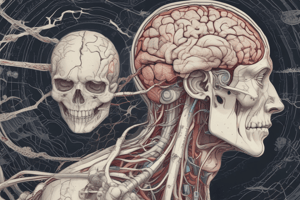Podcast
Questions and Answers
What is the central principle of Charles Darwin's theory of natural selection?
What is the central principle of Charles Darwin's theory of natural selection?
- Organisms adapt to their environment through conscious choice.
- Organisms evolve through natural selection acting on genetic variations. (correct)
- Organisms evolve to become more complex over time.
- Organisms evolve through random mutations.
Which of the following is NOT considered a macromolecule in biology?
Which of the following is NOT considered a macromolecule in biology?
- Vitamins (correct)
- Carbohydrates
- Lipids
- Proteins
What is the primary function of homeostasis in the human body?
What is the primary function of homeostasis in the human body?
- To maintain a constant external environment.
- To maintain steady levels of vital internal conditions. (correct)
- To allow for growth and development.
- To facilitate the exchange of gases in the lungs.
Which organ system is responsible for the exchange of oxygen and carbon dioxide in the human body?
Which organ system is responsible for the exchange of oxygen and carbon dioxide in the human body?
Which type of tissue is responsible for movement in the human body?
Which type of tissue is responsible for movement in the human body?
What is the overall focus of the study of human biology?
What is the overall focus of the study of human biology?
What is the branch of biology that focuses specifically on studying living organisms, primarily humans?
What is the branch of biology that focuses specifically on studying living organisms, primarily humans?
Which branch of biology deals with the anatomy, physiology, and pathology of the nervous system?
Which branch of biology deals with the anatomy, physiology, and pathology of the nervous system?
Which kingdom do human beings belong to?
Which kingdom do human beings belong to?
According to cell theory, what are the basic units of structure and function in living organisms?
According to cell theory, what are the basic units of structure and function in living organisms?
In which type of cells are defined nucleus and membrane-bound organelles present?
In which type of cells are defined nucleus and membrane-bound organelles present?
What is the process that leads to new species arising from older ones called?
What is the process that leads to new species arising from older ones called?
Flashcards are hidden until you start studying
Study Notes
Human biology is a subtopic of biology that focuses specifically on the study of living organisms, primarily humans, and their interactions with their environment. Here are some relevant details and concepts:
Neurobiology
Neurobiology is the branch of biology dealing with the anatomy, physiology, and pathology of the nervous system. Humans possess a central nervous system comprised of the brain and spinal cord, responsible for coordinating and controlling all bodily functions.
Zoology
Zoology is the branch of biology that studies animals or animal life, both living and extinct. Human beings belong to the kingdom Animalia, characterized by multicellularity, heterotrophy, motility, and feeling.
Botany
Botany is the study of plants, their physiology, morphology, distribution, classification, and uses. Although humans are not plants, understanding plant biology is crucial because it provides essential resources such as food, medicine, and clothing materials.
Cell Theory
Cell theory posits that all living organisms are composed of cells, which are the basic units of structure and function in living things. Prokaryotic cells, found in bacteria and archaea, lack a nucleus or any other membrane-bound organelles. Eukaryotic cells, present in humans and other complex organisms, contain a defined nucleus and various membrane-bound organelles.
Evolution
Evolution is the process of gradual change in a population over generations, leading to new species arising from older ones. Charles Darwin's theory of natural selection postulates that species evolve through natural selection acting upon genetic variations in populations, resulting in traits beneficial for survival and reproduction becoming more common in subsequent generations.
Homeostasis
Homeostasis refers to the ability of an organism to maintain constant internal conditions, despite changes in external conditions. In humans, this involves maintaining steady levels of temperature, pH, blood pressure, and other variables vital for proper functioning.
Macromolecules
Macromolecules are large organic molecules made up of smaller molecules, often proteins, carbohydrates, lipids, and nucleic acids. They play essential roles in various biological processes, including energy storage, structure formation, communication, and catalysis.
Organ Systems
Organ systems are collections of organs that work together to perform a common function, such as respiratory, circulatory, digestive, nervous, endocrine, etc. For instance, the human respiratory system comprises organs like the lungs, which exchange oxygen and carbon dioxide with air, and the heart, responsible for pumping oxygenated blood throughout the body.
Tissues
Tissues are organized groups of similar cells performing the same function. Examples include muscle, bone, nerve, epithelial, connective, and specialized glandular tissues.
In summary, human biology encompasses the investigation of the form and function of human organisms, including their cells, systems, and interactions with their environment.
Studying That Suits You
Use AI to generate personalized quizzes and flashcards to suit your learning preferences.




